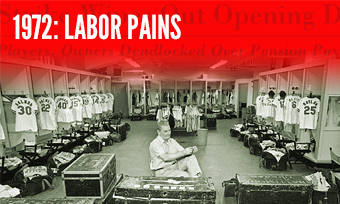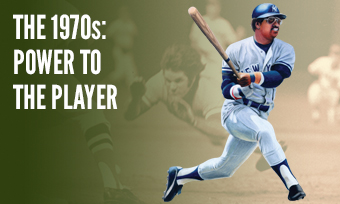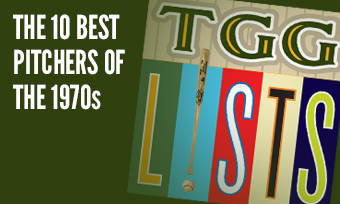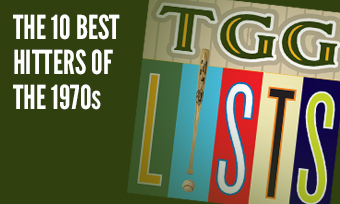The Yearly Reader
Leaders and Honors, 1972
Our list of baseball’s top 10 hitters and pitchers in both the American League and National League for the 1972 baseball season, as well as the awards and honors given to the game’s top achievers of the year.
The National League’s Top 10 Hitters, 1972
Bold type in brick red indicates league leader.
1. Billy Williams, Chicago
Key Numbers: .333 average, 95 runs, 191 hits, 34 doubles, 6 triples, 37 home runs, 122 RBIs, 20 intentional walks, .606 slugging percentage.
Williams nabbed his only batting crown thanks in part to Wrigley Field, where he hit .371; he came tantalizingly close to a triple crown, but finished a close second to Johnny Bench in RBIs, and a close third to Bench and Nate Colbert in home runs. (Most puzzlingly, he finished second to Bench in the MVP vote.)
2. Cesar Cedeno, Houston
Key Numbers: 139 games, .320 average, 103 runs, 179 hits, 39 doubles, 8 triples, 22 home runs, 81 RBIs, 55 stolen bases, 21 caught stealing.
It wasn’t all a loss for the Astros, who gave away Joe Morgan and John Mayberry during the offseason; they greatly profited from the smash upgrade provided by Cedeno, who put up Morgan-like numbers.
3. Joe Morgan, Cincinnati
Key Numbers: .292 average, 122 runs, 161 hits, 16 home runs, 73 RBIs, 115 walks, 58 stolen bases, .417 on-base percentage.
In dealing away Morgan (and Mayberry), the Astros continued to not realize what kind of talent they had until it was gone.
4. Johnny Bench, Cincinnati
Key Numbers: .270 average, 87 runs, 40 home runs, 125 RBIs, 100 walks, 23 intentional walks, 12 sacrifice flies.
The young Reds catcher won his second MVP in three years, sandwiching the honors around a ‘Bad Bench’ 1971 campaign that evoked memories of Roy Campanella’s yo-yo performances of the 1950s.
5. Jim Wynn, Houston
Key Numbers: .273 average, 117 runs, 29 doubles, 24 home runs, 90 RBIs, 103 walks, 17 stolen bases.
It wouldn’t be long before Wynn would join the exodus of star Houston players from the Astrodome, but for now he remained a vital part of the Astros’ offense.
6. Willie Stargell, Pittsburgh
Key Numbers: 138 games, .293 average, 28 doubles, 33 home runs, 112 RBIs.
Stargell cleaned up on the two recent expansion franchises, hitting 14 home runs in 26 combined games against Montreal and San Diego.
7. Bobby Bonds, San Francisco
Key Numbers: .259 average, 118 runs, 29 doubles, 5 triples, 26 home runs, 80 RBIs, 44 stolen bases, 6 caught stealing.
Bonds was hitting a gaudy .304 on May 9—the day the Giants traded his mentor and teammate Willie Mays to the Mets. He hit only .251 for the rest of the year.
8. Nate Colbert, San Diego
Key Numbers: .250 average, 87 runs, 27 doubles, 38 home runs, 111 RBIs, 15 stolen bases.
Colbert’s 111 RBIs made up one-quarter of San Diego’s team total; a quarter of those seemed to come on one day, an August 1 doubleheader at Atlanta (he actually had 13). Colbert’s 38 homers matched his 1970 total and remained the Padres’ high point until 1996.
9. Pete Rose, Cincinnati
Key Numbers: 154 games, .307 average, 645 at-bats, 107 runs, 198 hits, 31 doubles, 11 triples, 6 home runs, 57 RBIs, 73 walks, 10 stolen bases.
Rose is currently tied with Ichiro Suzuki with 10 career 200-hit seasons; he likely would have had an 11th had eight games not been lost to the April work stoppage.
10. Hank Aaron, Atlanta
Key Numbers: 129 games, .265 average, 34 home runs, 77 RBIs, 92 walks.
The sun was nearing the horizon on Aaron’s career as the 38-year old posted his worst batting average yet, but he still wielded enough pop to remain a big-time threat to Babe Ruth’s career home run record.
The American League’s Top 10 Hitters, 1972
1. Dick Allen, Chicago
Key Numbers: .308 average, 90 runs, 28 doubles, 5 triples, 37 home runs, 113 RBIs, 99 walks, 19 stolen bases, .420 on-base percentage, .603 slugging percentage.
Allen got pretty much everything he wanted from the White Sox: A league-high $250k salary, a yes-man in manager Chuck Tanner, and the only MVP of his career.
2. Bobby Murcer, New York
Key Numbers: .292 average, 102 runs, 171 hits, 30 doubles, 7 triples, 33 home runs, 96 RBIs, 11 stolen bases.
Another superb effort for the underrated Yankees star, setting a personal best in home runs, RBIs and runs scored.
3. John Mayberry, Kansas City
Key Numbers: .298 average, 25 home runs, 100 RBIs, 78 walks.
The first-year Royal arrived a little late to the party but ending up becoming the life of it—hitting .328 with 22 home runs after June 1.
4. Carlos May, Chicago
Key Numbers: .308 average, 83 runs, 26 doubles, 12 home runs, 68 RBIs, 79 walks, 23 stolen bases.
Whether by intention or not, May wore his birthday (May 17) on the back of his uniform. Take away May and Dick Allen—both of whom hit .308 for Chicago—and the White Sox’ team batting average is .220.
5. Carlton Fisk, Boston
Key Numbers: 131 games, .293 average, 28 doubles, 9 triples, 22 home runs, 61 RBIs.
After 70 years, the Red Sox finally had an All-Star-caliber catcher in Fisk, the unanimous choice for AL Rookie of the Year.
6. Joe Rudi, Oakland
Key Numbers: .305 average, 94 runs, 181 hits, 32 doubles, 9 triples, 19 home runs, 75 RBIs.
Quiet and business-like in a working-class manner, Rudi was the anti-Athletic in a clubhouse full of brash egos. “He doesn’t belong on this team; he gets along with everybody,” said Reggie Jackson. One MVP voter liked him enough to give him a first-place nod on the ballot.
7. Reggie Smith, Boston
Key Numbers: 131 games, .270 average, 25 doubles, 21 home runs, 74 RBIs, 15 stolen bases.
Smith absorbed through a more muted (yet still fairly potent) year statistically; rumor had it that he was not getting along with rookie Carlton Fisk.
8. Mike Epstein, Oakland
Key Numbers: .270 average, 26 home runs, 70 RBIs, 11 hit-by-pitches.
An early, almost forgotten component of the A’s championship run, Epstein surely made for more lasting memories upon teammates who remembered his superior clutch hitting in 1972.
9. Lou Piniella, Kansas City
Key Numbers: .312 average, 179 hits, 33 doubles, 11 home runs, 72 RBIs, 25 grounded into double plays.
Now in his fourth full year with the Royals, Piniella showed off the huff-and-puff that would define his future managerial years by leading the majors in ejections (with three).
10. Roy White, New York
Key Numbers: .270 average, 76 runs, 29 doubles, 10 home runs, 54 RBIs, 99 walks, 23 stolen bases.
The veteran outfielder’s power numbers, which were never very impressive to begin with, became even more boxed in—but he made it up by leading the AL in walks.
The National League’s Top 10 Pitchers, 1972
1. Steve Carlton, Philadelphia
Key Numbers: 1.97 ERA, 27 wins, 10 losses, .730 win percentage, 41 starts, 30 complete games, 8 shutouts, 346.1 innings, 310 strikeouts, 22 stolen bases allowed, 23 grounded into double plays.
The Cardinals turned down Carlton’s request for a $10,000 pay raise and traded him to the Phillies, who with the southpaw in 1972 became the tale of two teams; they were 27-10 with him, 32-87 without.
2. Don Sutton, Los Angeles
Key Numbers: 2.08 ERA, 19 wins, 9 losses, .679 win percentage, 33 starts, 9 shutouts, 272.2 innings, 63 walks.
Sutton produced the two longest strings of consecutive scoreless innings (36 and 30.2) of his Hall-of-Fame career, resulting in a personal-best ERA.
3. Bob Gibson, St. Louis
Key Numbers: 2.46 ERA, 19 wins, 11 losses, 34 starts, 23 complete games, 278 innings, 10 wild pitches.
In his last dominant year at age 36, Gibson failed to win any of his first eight starts, with a 4.45 ERA—then won each of his next 11, with a 1.39 figure.
4. Steve Blass, Pittsburgh
Key Numbers: 2.49 ERA, 19 wins, 8 losses, .704 win percentage, 32 starts, 249.2 innings, 84 walks, 32 grounded into double plays.
Blass won a career-best 19 games one year before becoming inflicted with “Blass Disease”—a complete inability to find the strike zone.
5. Claude Osteen, Los Angeles
Key Numbers: 2.64 ERA, 20 wins, 11 losses, 33 starts, 252 innings, 22 grounded into double plays.
Arguably the veteran southpaw’s best effort yet, winning 20 games for the second time while posting a career-low ERA; oddly, 14 of his 20 wins came away from pitcher-friendly Dodger Stadium.
6. Gary Nolan, Cincinnati
Key Numbers: 1.99 ERA, 15 wins, 5 losses, .750 win percentage, 25 starts, 176 innings, 30 walks.
Superb effort for the young (24) right-hander before succumbing to shoulder issues late in the year that would ultimately lead to surgery and a virtual absence from 1973-74 to recover.
7. Dock Ellis, Pittsburgh
Key Numbers: 2.70 ERA, 15 wins, 7 losses, .682 win percentage, 25 starts, 163.1 innings, 33 walks.
Two years to the day that Ellis famously achieved his LSD-influenced no-hitter at San Diego, Ellis returned to face the Padres and threw the second-best gem of his career—allowing two hits through nine shutout innings before exiting a 0-0 game won in 18 by the Pirates.
8. Tom Seaver, New York
Key Numbers: 2.92 ERA, 21 wins, 12 losses, 35 starts, 262 innings, 15 caught stealing/picked off.
Seaver never threw a no-hitter wearing the uniform of the Mets, but he came closest on the Fourth of July when, with one out in the ninth, the Padres’ Leron Lee spoiled it with a single.
9. Jon Matlack, New York
Key Numbers: 2.32 ERA, 15 wins, 10 losses, 32 starts, 244 innings.
After pitching eight no-hitters in high school, Matlack emerged to ease the Mets’ pain of losing Nolan Ryan by turning in a Rookie of the Year performance.
10. Ferguson Jenkins, Chicago
Key Numbers: 3.20 ERA, 20 wins, 12 losses, 36 starts, 23 complete games, 289.1 innings, 62 walks.
Jenkins won at least 20 for the Cubs for the sixth straight year, tying Three Finger Brown’s franchise record.
The American League’s Top 10 Pitchers, 1972
1. Gaylord Perry, Cleveland
Key Numbers: 1.92 ERA, 24 wins, 16 losses, 1 save, 41 appearances, 40 starts, 29 complete games, 342.2 innings, 16 intentional walks, 11 wild pitches, 12 hit-by-pitches, 27 grounded into double plays.
The Astros (Joe Morgan, John Mayberry) and Mets (Nolan Ryan) weren’t the only teams mastering the brainless trade; the Giants would be kicking themselves for years after dealing Perry to the Indians for a washed-up (and, alas, liquored-up) Sam McDowell. Perry edged out Wilbur Wood for the Cy Young Award, two years after his brother Jim won the honor for the Twins.
2. Catfish Hunter, Oakland
Key Numbers: 2.04 ERA, 21 wins, 7 losses, .750 win percentage, 37 starts, 295.1 innings.
After losing a toe in a childhood hunting accident, Hunter got a foothold on the peak of his career following six years of evolution—winning at least 20 games for the first of five straight seasons.
3. Wilbur Wood, Chicago
Key Numbers: 2.51 ERA, 24 wins, 17 losses, 49 starts, 20 complete games, 8 shutouts, 376.2 innings, 74 walks, 20 stolen bases, 18 caught stealing/picked off, 33 grounded into double plays.
Pitching often on three days’ rest and sometimes just two, Wood became Ed Walsh reincarnate. His 49 starts and 376.2 innings were the most since the White Sox ironman in, respectively, 1908 and 1912.
4. Steve Kline, New York
Key Numbers: 2.40 ERA, 16 wins, 9 losses, 32 starts, 236.1 innings, 44 walks, 26 grounded into double plays.
A flash in the Yankee pan, Kline was in strong shape to win the AL ERA crown with a 1.71 figure in early September before a string of bad starts doomed his chances. Arm problems would ensue, and he’d never throw over 100 innings in a single season again.
5. Jim Palmer, Baltimore
Key Numbers: 2.07 ERA, 21 wins, 10 losses, 36 starts, 274.1 innings.
The only one of Baltimore’s four 20-game winners from the year before who repeated the feat, Palmer began to show who the real Orioles ace was.
6. Luis Tiant, Boston
Key Numbers: 1.91 ERA, 15 wins, 6 losses, .714 win percentage, 3 saves, 43 appearances, 19 starts, 179 innings.
The re-awakening of El Tiante; the former 20-game winner, whose career plunged into disarray and minor league stints in 1971, game roaring back with a late-season charge in the rotation that barely netted him his second ERA crown. His streak of 40.1 consecutive scoreless innings is the third longest in Red Sox history, and along with a 42-inning run in 1968 made him only one of two pitchers (Walter Johnson being the other) with multiple streaks of 40 or more innings.
7. Pat Dobson, Baltimore
Key Numbers: 2.65 ERA, 16 wins, 18 losses, 36 starts, 268.1 innings, 30 grounded into double plays.
Despite throwing better than during his 20-9 ledger of the year before, Dobson was robbed of another 20-win effort—and came perilously close to 20 losses—thanks to a suddenly DOA Orioles offense.
8. Roger Nelson, Kansas City
Key Numbers: 2.08 ERA, 11 wins, 6 losses, 2 saves, 34 appearances, 19 losses, 173.1 innings, 31 walks.
The fleeting hybrid starter/reliever recorded a 0.871 WHIP (walks/hits allowed per inning)—the lowest ever recorded by a Royals pitcher.
9. Mickey Lolich, Detroit
Key Numbers: 2.50 ERA, 22 wins, 14 losses, 41 starts, 23 complete games, 327.1 innings.
Lolich had 18 wins at the end of July and there were whispers that maybe, just maybe, he could get to 30—but he only won four of his remaining 15 starts.
10. Nolan Ryan, California
Key Numbers: 2.28 ERA, 19 wins, 16 losses, 39 starts, 20 complete games, 9 shutouts, 284 innings, 157 walks, 329 strikeouts, 18 wild pitches, 10 hit-by-pitches, 40 stolen bases allowed.
After five somewhat frustrating years with the Mets, the Ryan Express found high-gear bliss in Anaheim as the Angels unleashed him upon a higher strike zone than he experienced in the NL. Ryan particularly loved Anaheim Stadium, where he authored a 1.07 ERA with 220 of his strikeouts.









